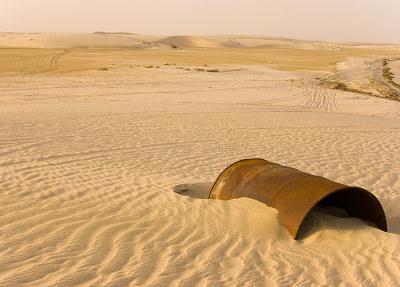
OIL PRICES: SAUDI NEED

Ali al-Naimi, the oil minister of Saudi Arabia, was in no mood to address reporters at Opec's November meeting, refusing to offer more than a few words after the cartel decided to hold output at 30m barrels a day.
His unwillingness to talk added to an information vacuum that had been building for months, putting further pressure on oil prices. From the middle of June oil slid through the $100 a barrel barrier to below $80 and is now hovering at $60.
Although backroom comments by Saudi officials to US hedge fund managers and oil analysts had filtered out into the investor community before the meeting, Mr Naimi stuck to stock phrases, even as poorer Opec members ramped up the rhetoric for cuts to bolster prices.
But this week the oil minister for Opec's largest producer and de facto leader spoke out. In a series of interviews with specialist energy publications and other reporters on the sidelines of an Arab energy conference, he spelt out why Opec may no longer be the mechanism to balance an oversupplied market.
He spoke of his role in persuading the 12 member cartel of the reasons to keep production at current levels. "As a policy for Opec — and I convinced Opec of this — even Mr al Badri [Opec secretary-general] is now convinced, it is not in the interest of Opec producers to cut their production," Mr Naimi told the Middle East Economic Survey.
"Whether it [the price] goes down to $20 a barrel, $40 a barrel, $50 a barrel, $60 a barrel, it is irrelevant," he said. This was a strategy not just in response to the current oil price rout, but also for the future, he added.
Some market observers are not convinced this is a permanent shift to avert production cuts; even Mr Naimi said "there is no such thing as never". A month ago the option of output cuts was still on the table, on condition that Saudi Arabia could enlist non-Opec support.
But in a pre-Opec meeting it became clear Russia had no intention of collaborating. This did not surprise Mr Naimi, making way for the current strategy. "It is obvious from my previous experience that others [from outside Opec] will not cut," he said.
Mr Naimi's most recent remarks shine a light on the thinking behind a decision to let market forces — or prices — balance supply and demand, marking a significant departure from the cartel's traditional policy of reducing supply to stabilise price drops.
"The fact that Opec led by Saudi Arabia is no longer willing to put a floor on the price has come as a shock to many people. It's a foreign idea," says Bob McNally, a former White House official and now head of Rapidan Group, a Washington-based consultancy.
"That's why we've seen Mr Naimi go to such great lengths these past few days to communicate this message and counter the disbelief, that they will not cut production," he adds.
It is probably no coincidence that these remarks come at a time when Mr Naimi has been criticised domestically for not clearly communicating his thinking and explaining a policy that has contributed to further dramatic falls in the oil price and roiled the country's stock market.
"The slump in prices has shocked local businessmen and the investment community," says Tarek Fadlallah, chief executive of Nomura Asset Management Middle East. "Naimi feels the need to justify what appears to be a self-harming policy."
Mr Naimi's comments reflect an explicit desire to cause long-term damage to high-cost production, most of which is non-Opec, that has been encroaching on Opec's market share. He also revealed concerns about rising investment in renewable energy.
"Is it reasonable for a highly efficient producer to reduce output, while the producer of poor efficiency continues to produce? That is crooked logic," said Mr Naimi. "If I reduce, what happens to my market share? The price will go up and the Russians, the Brazilians, US shale oil producers will take my share."
Although Saudi Arabia still desired higher oil prices, a period of lower prices was needed to induce demand and spur a pullback in spending and exploration from the world's biggest oil companies, he said.
"Brazil's sub-salt wells, west African wells and Arctic wells are high cost. So sooner or later, however much they hold out, in the end, their financial affairs will limit their production." This would sow the seeds for a price recovery.
Aside from articulating the reasons for why it was not in Opec's interest to not cut production, Mr Naimi went as far as telling the Saudi press it may even raise output in the event that new customers emerge.
Could the Saudis ramp up production, and start a full-blown price war? "I think it is probably unlikely as the market is doing the job for them," says Paul Horsnell at Standard Chartered, a longtime Opec watcher. "But it remains a viable option should they need it."
For anyone doubting his resolve, Mr Naimi said Saudi Arabia and its Gulf allies with little debt and access to bank financing could withstand two or three years of prices at these levels. But some observers, such as Harold Hamm, a leading figure in the US shale industry, say these comments are just "bravado". Others such as Venezuela and Nigeria are already in economic turmoil. "They can't live with these prices," says Mr Hamm.
ft.com





